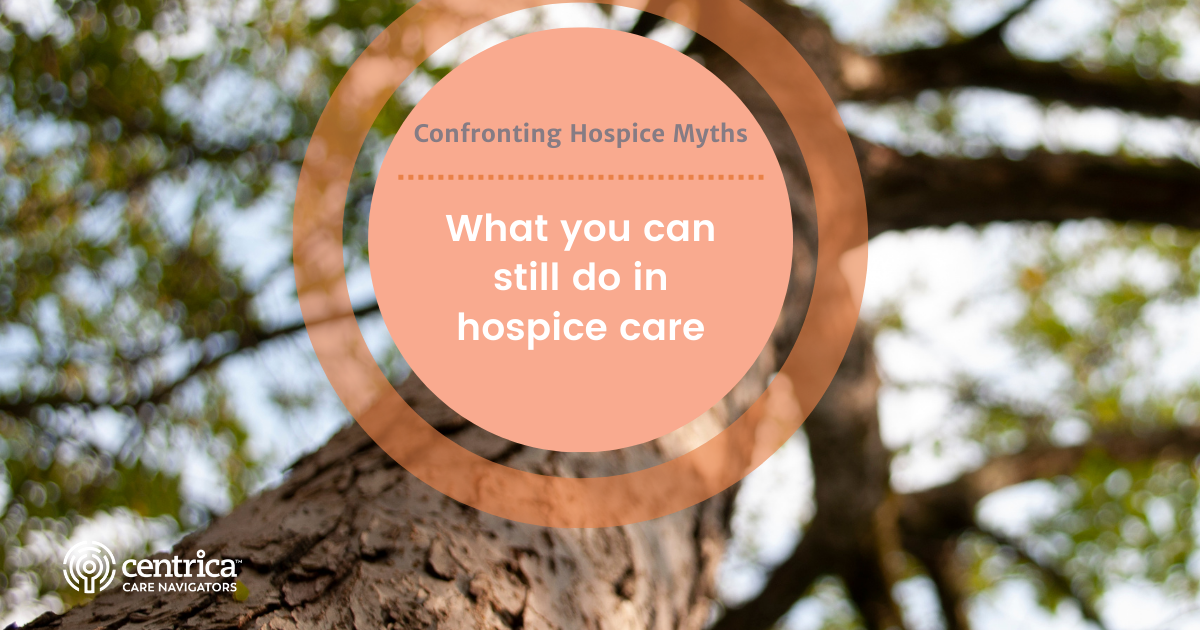Hospice is care for you or a loved one at the end of your life, when there’s a life-limiting illness and life expectancy is six months or fewer. It’s not the kind of care you get when you see a doctor at other times in your life, but care is much more than medication.
Hospice is about caring for yourself in the time you have remaining. While you are in hospice, your doctors, your caregivers, and you yourself all contribute to a plan of care. It discusses everything related to care and comfort of a patient, from nurse visits to conversations with a chaplain on spiritual issues, and beyond. As a patient, you don’t have to worry that you’re being ignored by doctors, or that your medication isn’t being scheduled.
When it is time for you to be in end-of-life care, don’t think of it as “giving up”… because you’re not giving up! You’re still doing everything you can to make life better for you, your loved ones, and even the medical team that works with you.
What does that include? It really depends on you, and what you think is important. Your plan of care will outline what doctors and nurses need to know to help with pain and symptoms of your disease. But the rest is what you want to do with the time you have left. Spend time with your family and friends. Take time to enjoy the things you like most – music, books, even just quiet moments – and find peace and comfort.
Do what you want to do
There are many things patients and caregivers can do in the weeks and months a patient is in Centrica Care Navigators hospice service. We can schedule visits by music therapists, who can play and sing, as well as pet therapy, where dogs stop by to be petted or just to sit quietly.
Chaplains provide spiritual comfort for those who want it, and are there just to listen if that’s better for the patient.
Maybe most importantly, many patients use their time in end-of-life care to prepare their loved ones. That might be making legal arrangements for after their death (we can help with that, too: we provide clear guidelines on what to do). Or it could be saying goodbye, visiting with grandchildren, and resolving old differences that kept family members apart for years.
Myths and misconceptions
There are a lot of myths and misconceptions about what end-of-life care is, starting with the thought that it’s only hospice, and only for those who are guaranteed to die very soon. At Centrica Care Navigators, we have several teams who spend a lot of their time exploring those myths and explaining how much we really do offer to our patients, caregivers, and their loved ones.
Many patients do enter hospice care just a few days or weeks before their death, though care was often already available to them for months. We have heard from many families that they wished they had started hospice long before they did, the better to enjoy the benefits of end-of-life care.
Hospice isn’t about dying, or giving up hope for the future. Instead, it’s a time for a different kind of hope: hope that your last days are everything you want them to be.
About Centrica Care Navigators
Centrica Care Navigators, formerly Hospice Care of Southwest Michigan, is a private, nonprofit healthcare agency supporting individuals and caregivers coping with illness, aging, dying, and loss. Founded in 1981, Centrica Care Navigators provides care of the body, mind, and spirit for the residents of Allegan, Barry, Berrien, Branch, Calhoun, Cass, Eaton, Kalamazoo, St. Joseph, and Van Buren counties. Service is available to everyone, even those without insurance coverage. To learn more, visit CentricaCare.org.




